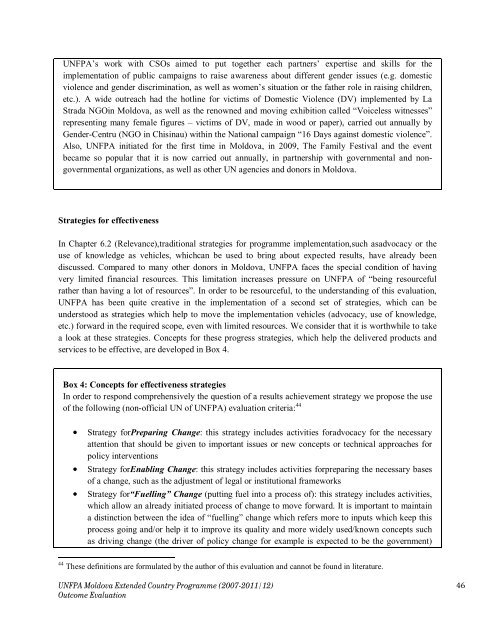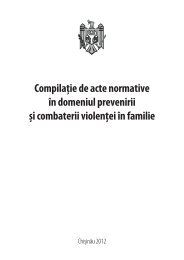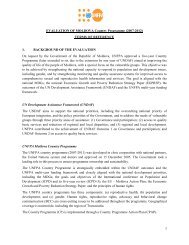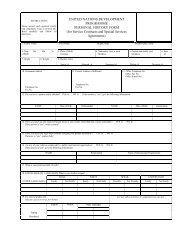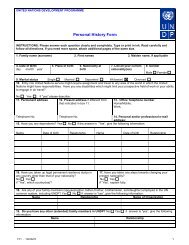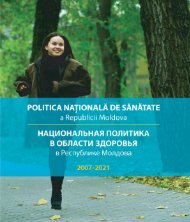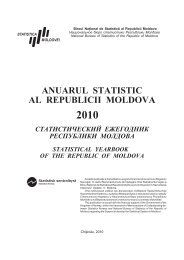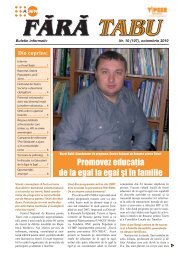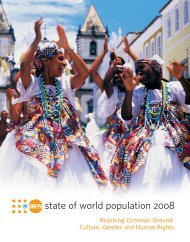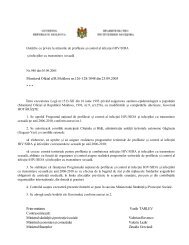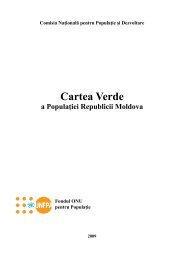Country Programme (2007-2011/2012) evaluation - UNFPA Moldova
Country Programme (2007-2011/2012) evaluation - UNFPA Moldova
Country Programme (2007-2011/2012) evaluation - UNFPA Moldova
Create successful ePaper yourself
Turn your PDF publications into a flip-book with our unique Google optimized e-Paper software.
<strong>UNFPA</strong>’s work with CSOs aimed to put together each partners’ expertise and skills for the<br />
implementation of public campaigns to raise awareness about different gender issues (e.g. domestic<br />
violence and gender discrimination, as well as women’s situation or the father role in raising children,<br />
etc.). A wide outreach had the hotline for victims of Domestic Violence (DV) implemented by La<br />
Strada NGOin <strong>Moldova</strong>, as well as the renowned and moving exhibition called “Voiceless witnesses”<br />
representing many female figures – victims of DV, made in wood or paper), carried out annually by<br />
Gender-Centru (NGO in Chisinau) within the National campaign “16 Days against domestic violence”.<br />
Also, <strong>UNFPA</strong> initiated for the first time in <strong>Moldova</strong>, in 2009, The Family Festival and the event<br />
became so popular that it is now carried out annually, in partnership with governmental and nongovernmental<br />
organizations, as well as other UN agencies and donors in <strong>Moldova</strong>.<br />
Strategies for effectiveness<br />
In Chapter 6.2 (Relevance),traditional strategies for programme implementation,such asadvocacy or the<br />
use of knowledge as vehicles, whichcan be used to bring about expected results, have already been<br />
discussed. Compared to many other donors in <strong>Moldova</strong>, <strong>UNFPA</strong> faces the special condition of having<br />
very limited financial resources. This limitation increases pressure on <strong>UNFPA</strong> of “being resourceful<br />
rather than having a lot of resources”. In order to be resourceful, to the understanding of this <strong>evaluation</strong>,<br />
<strong>UNFPA</strong> has been quite creative in the implementation of a second set of strategies, which can be<br />
understood as strategies which help to move the implementation vehicles (advocacy, use of knowledge,<br />
etc.) forward in the required scope, even with limited resources. We consider that it is worthwhile to take<br />
a look at these strategies. Concepts for these progress strategies, which help the delivered products and<br />
services to be effective, are developed in Box 4.<br />
Box 4: Concepts for effectiveness strategies<br />
In order to respond comprehensively the question of a results achievement strategy we propose the use<br />
of the following (non-official UN of <strong>UNFPA</strong>) <strong>evaluation</strong> criteria: 44<br />
• Strategy forPreparing Change: this strategy includes activities foradvocacy for the necessary<br />
attention that should be given to important issues or new concepts or technical approaches for<br />
policy interventions<br />
• Strategy forEnabling Change: this strategy includes activities forpreparing the necessary bases<br />
of a change, such as the adjustment of legal or institutional frameworks<br />
• Strategy for“Fuelling” Change (putting fuel into a process of): this strategy includes activities,<br />
which allow an already initiated process of change to move forward. It is important to maintain<br />
a distinction between the idea of “fuelling” change which refers more to inputs which keep this<br />
process going and/or help it to improve its quality and more widely used/known concepts such<br />
as driving change (the driver of policy change for example is expected to be the government)<br />
44 These definitions are formulated by the author of this <strong>evaluation</strong> and cannot be found in literature.<br />
<strong>UNFPA</strong> <strong>Moldova</strong> Extended <strong>Country</strong> <strong>Programme</strong> (<strong>2007</strong>-<strong>2011</strong>/12)<br />
Outcome Evaluation<br />
46


